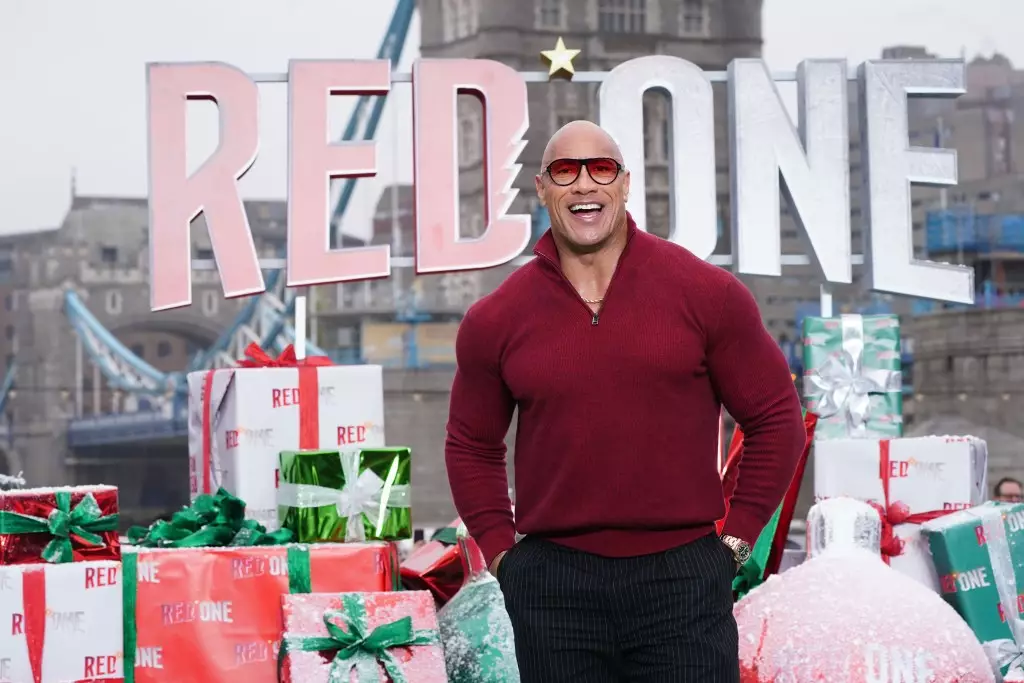In the ever-churning world of Hollywood, few stories ignite as much fervor as the exploits of A-list celebrities. The recent uproar surrounding Dwayne “The Rock” Johnson paints a vivid picture of how quickly public perception can shift, especially under the glare of media scrutiny. In a GQ feature, Johnson addresses allegations about his behavior on the set of the holiday film “Red One,” including late arrivals and some peculiar bathroom habits that have set tongues wagging in the industry and beyond.
The infamous report from The Wrap claimed that Johnson was frequently tardy, at times reportedly arriving up to eight hours late. This inefficiency was not simply a minor inconvenience; it was alleged to have inflated the film’s budget by an outrageous $250 million—a figure that Johnson himself dismissed as “bananas” and “ridiculous.” He is quoted as saying, “Yeah, that happens too,” regarding timings, but emphasizing that the budget claims were unfounded. An interesting detail that emerges from this exchange is the actor’s candid nature; he opens himself to questioning with a seemingly honest demeanor, inviting inquiries into his work habits.
In the same GQ article, the film’s director, Jake Kasdan, and co-star Chris Evans leap to Johnson’s defense, both framing the actor in a far more positive light. Kasdan asserts that despite occasional lateness—an almost universal trait in the industry—Johnson is nothing short of committed. “He never missed a day of work ever,” Kasdan states, reflecting a respectful acknowledgment of Johnson’s dedication amidst a chaotic filming schedule.
Chris Evans, who has had the opportunity to work with Johnson on this project, offers his perspective on the actor’s perceived tardiness. Evans points out that Johnson’s schedule is structured, which includes early morning workouts that many in the industry are well aware of. This pre-planned approach mitigates the surprise factor of his occasional delays; they are, in fact, part of a larger routine. Evans even shares an anecdote about a fund-raising raffle on set to illustrate Johnson’s generosity, wherein he increased the pot from four thousand to a staggering fifty thousand dollars—a gesture that not only speaks to his character but also highlights his ability to foster camaraderie among the cast and crew.
This saga is emblematic of the broader implications of celebrity culture, where minor faux pas can be blown out of proportion, creating a narrative that often overshadows the individual’s contributions and character. Critics of such reporting argue that the media often thrives on sensationalism, preferring to generate clickbait headlines rather than facilitating meaningful discourse. In Johnson’s case, we see his uncharacteristic behavior being scrutinized while the broader context of his work ethic and community spirit gets hazy.
Moreover, the notion of using water bottles as makeshift urinals—while undoubtedly strange—serves as an indicator of the frenzied pace within the film industry. Perhaps it reflects a level of desperation to maximize productivity—something many professionals can relate to in high-pressure environments. Johnson’s frank admission about such unconventional practices invites both humor and a sense of relatability; after all, who hasn’t engaged in creative problem-solving at work?
The Dwayne Johnson controversy surrounding “Red One” may be a reflection of a broader dynamic in Hollywood and celebrity culture—but it also raises critical questions about accountability, kindness, and the nature of fame. While Johnson weathered the storm with poise and support from his colleagues, audiences are reminded of the human elements that underpin such high-stakes scenarios. As the film industry continues to evolve, the lens through which we view its stars should encourage a touch of compassion and an understanding of the realities they face. After all, behind the chiseled facade is a human being navigating the complex world of entertainment, just like the rest of us.

